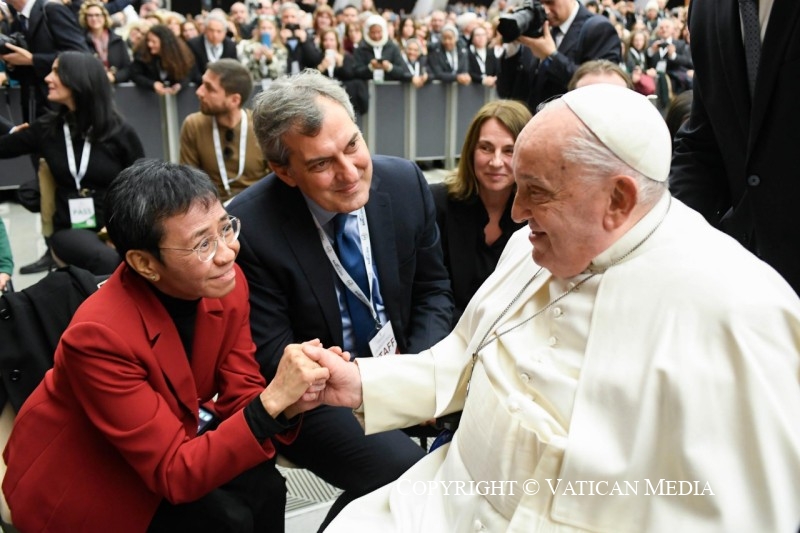Pope: may all unjustly imprisoned journalists be freed
The appeal in the speech delivered this morning in Rome to participants in the Jubilee of Communications. The warning by Filipino Nobel Maria Ressa: ‘Today's powers exploit the great media platforms to make us doubt everything and paralyse people’. Writer Colum McCann: ‘The distance between enemy and neighbour is shortened only by listening to their story’.
Vatican City (AsiaNews) - ‘I ask those in power to do so that all journalists unjustly imprisoned be freed. May a ‘door’ be opened for them too, through which they can return to freedom, because the freedom of journalists increases the freedom of all of us. Their freedom is freedom for each one of us'.
This is the appeal that Pope Francis made in his speech, not pronounced but delivered to the participants at the Jubilee of Communication, the first of the gatherings on the occasion of the Holy Year, held this morning in the Paul VI Hall at the Vatican.
The pontiff arrived at the end of the morning in the large hall, where journalists and media workers had already heard the powerful testimonies of Maria Ressa, the Filipino journalist who co-founded the Rappler website and won the Nobel Peace Prize for her commitment to freedom of information, and the Irish writer Colum McCann, a great promoter of the power of storytelling in the commitment to building a more just society.
Referring back then and to the 9-page speech he had in his hands, the pontiff addressed the audience with just a few words in his own words. ‘Your work,’ he said, ‘is work that builds: it builds society, it builds the Church, it moves everyone forward, as long as it is true. ‘Father, I always tell the truth...’. But you, are you true? Not just the things you say, but in your life, are you true?’. This is such a great test. After giving his blessing, he then went down to the Paul VI Hall, stopping for a long time to greet the thousands of communication workers present at this jubilee event.
In the text delivered and immediately published on the Holy See's website, Pope Francis also recalled the many journalists killed (last year at least 120) for seeking the truth and reporting the horrors of war. ‘We pray in silence for your colleagues who signed their service with their own blood,’ he asked.
In the text of the speech, the pontiff reiterated once again that ‘free, responsible and correct information is a patrimony of knowledge, experience and virtue that must be preserved and promoted. Without this, we run the risk of no longer distinguishing truth from lies; without this, we expose ourselves to growing prejudices and polarisations that destroy the bonds of civil coexistence and prevent fraternity from being rebuilt'.
In the context of the Jubilee, he finally invites people to ‘also tell stories of hope, stories that nourish life. Let your storytelling,' he adds, ’also be hopetelling. When you tell of evil, leave room for the possibility of mending what is torn, for the dynamism of good that can repair what is broken. Sow questions. Telling hope means seeing the crumbs of good hidden even when all seems lost, it means allowing hope even against all hope'.
Before him, Maria Ressa in her speech recalled that she still had to ask the Philippine Supreme Court for permission to travel to Rome because of the judicial consequences of the charges against her, which materialised in no less than ten requests for arrest for facts related to her work as a journalist.
As she had done in her acceptance speech for the Nobel Peace Prize in 2021, she returned to denounce the role of large social network platforms in the destruction of truthful information.
‘Geopolitical power games,’ she denounced, ’exploit the design of these platforms. Remember, the objective is not to make you believe something, but to make you doubt everything in order to paralyse you'. To journalists, he finally addressed four invitations: ‘First: collaborate among yourselves. Second: tell the truth with moral clarity. Third: protect the weakest to prevent the normalisation of hatred. Fourth: recognise your strength, because by working together you can be part of a wave of change for the good'.
‘The shortest distance between enemy and neighbour is a story,’ added Colum McCann for his part, ’The annihilation of the stories of those we perceive as enemies represents one of the world's most insidious weapons. Our inability to access the stories of others, rich in nuance and meaning, combined with our refusal to create spaces for listening and dialogue, constitutes one of the most serious dangers of our age'.
‘We live in dangerous times,’ he added, ’We cannot afford to ignore the experiences of others. Will telling and listening to stories save the world? Maybe yes, maybe no... but it will certainly offer, if nothing else, a glimmer of light and understanding. And where there is a glimmer of light, there is the possibility of many more to come, acting and working together, until at least some of the darkness is dispelled.
11/10/2021 09:26
24/01/2007







.png)










